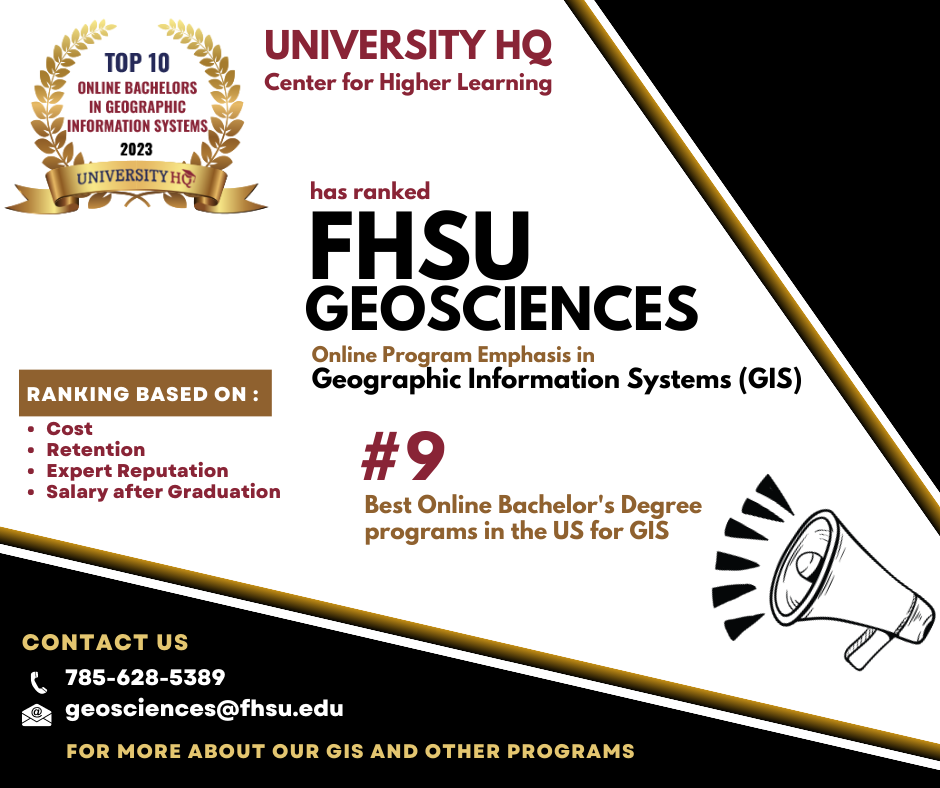Undergraduate Programs in Geosciences
The Department of Geosciences offers several Bachelor degree options: Bachelor of Science (B.S.) in Geosciences with an emphasis in either Geology or Geography*; Bachelor of Science (B.S.) in Geosciences with an emphasis in Applied Geology*; and a Bachelor of Arts (B.A.) in Environmental Geosciences*.
*Programs marked with * can be completed entirely online via FHSU Online.
Students completing our B.S. online (with a focus on Geography) or B.A. can simultaneously complete three separate certificates in addition to a Bachelor degree. Many of our programs incorporate classes that lead to completion of any one of four possible certificates.
Geology (B.S.) is largely a field-oriented science that examines the Earth's history, processes and materials, and how these areas of examination impact our lives. Multiple options are available for students to pursue specific study/emphasis areas within the field of Geology.
Geography (B.S)* is the study of where things are, and why things are where they are. Physical Geography is about patterns in the natural world, including the atmosphere, oceans, and solid land. Human Geography is about patterns of human cultural, political, and economic activity.
- Geographic Information Systems (GIS)* is a computer tool for manipulating and displaying spatial data (information about places and what can be found at those places) and conducting spacial analysis. GIS can be used for making maps, but it can do much more, including asking questions about relationships between places and how places have changed. GIS courses can be a major component of studies in Geography, as well as many other disciplines.
Applied Geology (B.S.)* geology is typically a field-oriented science exploring Earth's history, processes and materials, and how these areas of examination impact our lives. Applied geology is the program option for students wishing to pursue general studies in geology through an on-line experience.
Environmental Geosciences (B.A.)* is a combination of the geology and geography curriculums with an emphasis on human-environmental interactions. Language, policy, and leadership classes can be substituted for field- and lab-intensive courses.
Program Requirements
For more details regarding course requirements, download a PDF of our undergraduate curriculum, Bachelor of Science (B.S.) in Geology or Geography, Bachelor of Science (B.S.) in Applied Geology, or Bachelor of Arts (B.A.).
For B.S. in Geosciences, either a Geology- or Geography-focused, you'll need to complete Geoscience courses, General Education courses, and elective courses (courses that may be inside or outside of Geosciences).
For B.S. in Geosciences, Applied Geology, you'll need to complete Geoscience courses, General Education courses, elective courses (courses that may be inside or outside of Geosciences), and specific applied technology/geology courses.
For the B.A. in Environmental Geosciences, you’ll need to complete Geosciences courses, General Education courses, elective courses (that maybe inside or outside of Geosciences) and a foreign language requirement.
Wondering what course listings in your area of interest might look like?
Below, you will find curriculum guides for popular student interests. These guidelines are only suggestions. Once you select an area of emphasis, you will have some freedom to work with your adviser to tailor your curriculum to fit your interests.
B.S. GEOSCIENCES - GEOGRAPHY suggested curriculum list
Human or Physical Geography
ONLINE Geography
Geographic Information Systems (GIS)B.S. GEOSCIENCES - GEOLOGY suggested curriculum list
Traditional Geology
Environmental Geology
Paleontology
Petroleum GeologyB.S. GEOSCIENCES - APPLIED GEOLOGY suggested curriculum list
ONLINE Geology - Applied Geology, suggested curriculum listB.A. GEOSCIENCES - ENVIRONMENTAL GEOSCIENCES suggested curriculum list
On-campus/Online
